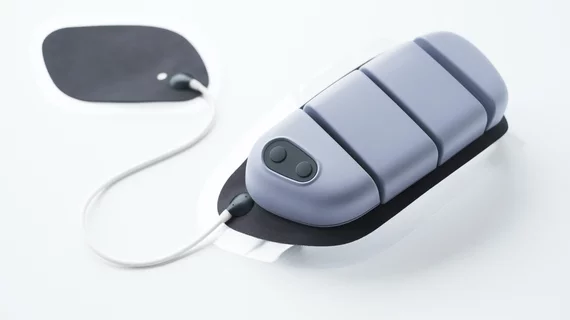New patch-based wearable defibrillator receives CE mark approval
Element Science, a San Francisco-based medical device company, has gained CE mark approval for its new patch-based cardioverter defibrillator.
The Jewel Patch Wearable Cardioverter Defibrillator (P-WCD) is a compact, water-resistant device for identifying irregular heartbeats in patients who face a heightened risk of sudden cardiac arrest (SCA). It was designed to be less bulky and easier to wear for long periods of time than traditional vest-type wearable cardioverter defibrillators. The Jewel P-WCD can be worn in the shower, overnight and during most physical activities, including exercise.
In addition to receiving CE mark approval, the device also gained Great Britain’s UKCA marking, which covers England, Wales and Scotland.
“Out-of-hospital SCA remains a significant problem in the United States and Europe with approximately only about 10% of patients surviving,” Uday N. Kumar, founder, president and CEO of Element Science, said in a statement. “The Jewel was developed to address the compliance issues of garment-based wearable cardioverter defibrillators by focusing on user experience design and by incorporating advanced machine learning algorithms, both of which are approaches common in consumer wearables, but relatively uncommon in medical device development.”
“Element Science is on the leading edge of leveraging advancements in machine learning, wearable technologies, and miniaturization to revolutionize the way patients receive care,” added Hank Kucheman, who was Boston Scientific’s CEO back in 2011 and now holds a place on Element Science’s board of directors. “Based on my long experience in medical technology development, the rigor of the approach with which the Jewel P-WCD was designed and tested has been validated by these approvals. The company is now well positioned to plan for delivering this lifesaving technology to patients outside the U.S.”
Element Science received these new approvals in part based on data from the Jewel IDE Study, which examined the device’s safety and effectiveness in more than 300 high-risk patients. Initial results of that study included a high rate of patient compliance and no deaths or serious device-related adverse events.
This Jewel P-WCD has not been approved by the U.S. Food and Drug Administration. It is only available as an investigational device in the United States at this time.

